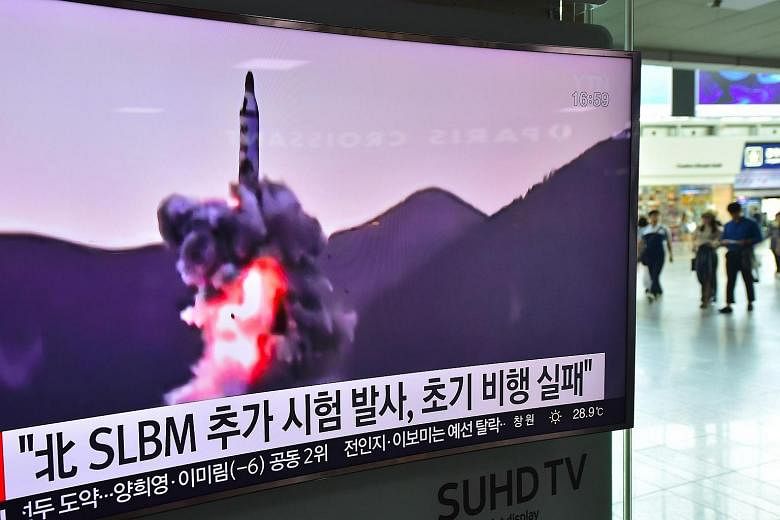SEOUL (REUTERS) - North Korea fired three ballistic missiles early on Tuesday (July 19), which flew between 500km and 600 km into the sea off its east coast, South Korea's military said, the latest in a series of provocative moves by the isolated country.
The missiles, which South Korea's Yonhap News Agency said were presumed to be Scud types, were launched from an area in the North's western region called Hwangju between 5.45am local time and 6.40am, the South's military said.
The United States military said it detected and tracked three North Korean missile launches over the span of nearly an hour. US Strategic Command said in a statement it detected the launches of what it believed were two Scud tactical ballistic missiles and a No Dong intermediate-range ballistic missile.
The North American Aerospace Defense Command determined the missile launches from North Korea did not pose a threat to North America, the statement said.
Tuesday's launches came days after South Korea and the United States announced a final decision to deploy the Terminal High Altitude Area Defence (THAAD) anti-missile system in the South to counter threats from the North. "The ballistic missiles flight went from 500km to 600km, which is a distance far enough to strike all of South Korea including Busan," the South's military said in a statement.
Busan is a South Korean port city in the south.
North Korea has test-fired a series of ballistic missiles in recent months, in defiance of United Nations Security Council resolutions, including intermediate-range missiles in June and a submarine-launched missile this month.
North Korea's military had threatened to retaliate against the deployment of the THAAD system with a "physical response" once its location and time of installation were decided.
China has also sharply criticized the decision to base a THAAD battery in South Korea, saying the move will destabilise the security balance in the region.
North Korea conducted its fourth test of a nuclear device in January, and activity at its nuclear test site has increased recently, according to media reports in South Korea and Japan citing government officials, as well as a report by Washington-based North Korea monitoring project 38 North.
Following Pyongyang's January nuclear test and a February space rocket launch that was widely viewed as a missile test in disguise, the United Nations Security Council imposed tough new resolutions that further isolate North Korea.
In addition to the decision to base a THAAD system in South Korea, the United States recently angered North Korea by blacklisting its leader Kim Jong Un for human rights abuses.

